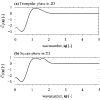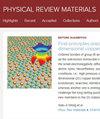Generalizing the structural phase field crystal approach for modeling solid-liquid-vapor phase transformations in pure materials
IF 3.4
3区 材料科学
Q2 MATERIALS SCIENCE, MULTIDISCIPLINARY
引用次数: 0
Abstract
In a recent class of phase field crystal (PFC) models, the density order parameter is coupled to powers of its mean field. This effectively introduces a phenomenology of higher-order direct correlation functions acting on long wavelengths, which is required for modeling solid-liquid-vapor systems. The present work generalizes these models by incorporating, into a single-field theory, higher-order direct correlations, systematically constructed in reciprocal space to operate across long and short wavelengths. The correlation kernels introduced are also readily adaptable to describe distinct crystal structures. We examine the three-phase equilibrium properties and phase diagrams of the proposed model, and reproduce parts of the aluminum phase diagram as an example of its versatile parametrization. We assess the dynamics of the model, showing that it allows robust control of the interface energy between the vapor and condensed phases (liquid and solid). We also examine the dynamics of solid-vapor interfaces over a wide range of parameters and find that dynamical artifacts reported in previous PFC models do not occur in the present formalism. Additionally, we demonstrate the capacity of the proposed formalism for computing complex microstructures and defects such as dislocations, grain boundaries, and voids in solid-liquid-vapor systems, all of which are expected to be crucial for investigating rapid solidification processes.

推广结构相场晶体法,为纯材料中的固-液-气相转变建模
在最近的一类相场晶体(PFC)模型中,密度阶参数与其平均场的幂次耦合。这有效地引入了作用于长波长的高阶直接相关函数现象学,而这正是固-液-汽系统建模所需要的。本研究通过在单场理论中加入高阶直接相关,对这些模型进行了概括,并在倒易空间中系统地构建了作用于长波长和短波长的高阶直接相关。引入的相关核也很容易适应于描述不同的晶体结构。我们研究了所提出模型的三相平衡特性和相图,并以铝相图为例,再现了其多功能参数化。我们对模型的动态进行了评估,结果表明该模型可对气相和凝聚相(液相和固相)之间的界面能量进行稳健控制。我们还考察了固-汽界面在广泛参数范围内的动力学特性,发现以往 PFC 模型中出现的动力学假象在本模型中不会出现。此外,我们还展示了所提出的形式主义在计算复杂微结构和缺陷(如位错、晶界和固-液-汽体系中的空隙)方面的能力,所有这些对于研究快速凝固过程都至关重要。
本文章由计算机程序翻译,如有差异,请以英文原文为准。
求助全文
约1分钟内获得全文
求助全文
来源期刊

Physical Review Materials
Physics and Astronomy-Physics and Astronomy (miscellaneous)
CiteScore
5.80
自引率
5.90%
发文量
611
期刊介绍:
Physical Review Materials is a new broad-scope international journal for the multidisciplinary community engaged in research on materials. It is intended to fill a gap in the family of existing Physical Review journals that publish materials research. This field has grown rapidly in recent years and is increasingly being carried out in a way that transcends conventional subject boundaries. The journal was created to provide a common publication and reference source to the expanding community of physicists, materials scientists, chemists, engineers, and researchers in related disciplines that carry out high-quality original research in materials. It will share the same commitment to the high quality expected of all APS publications.
 求助内容:
求助内容: 应助结果提醒方式:
应助结果提醒方式:


